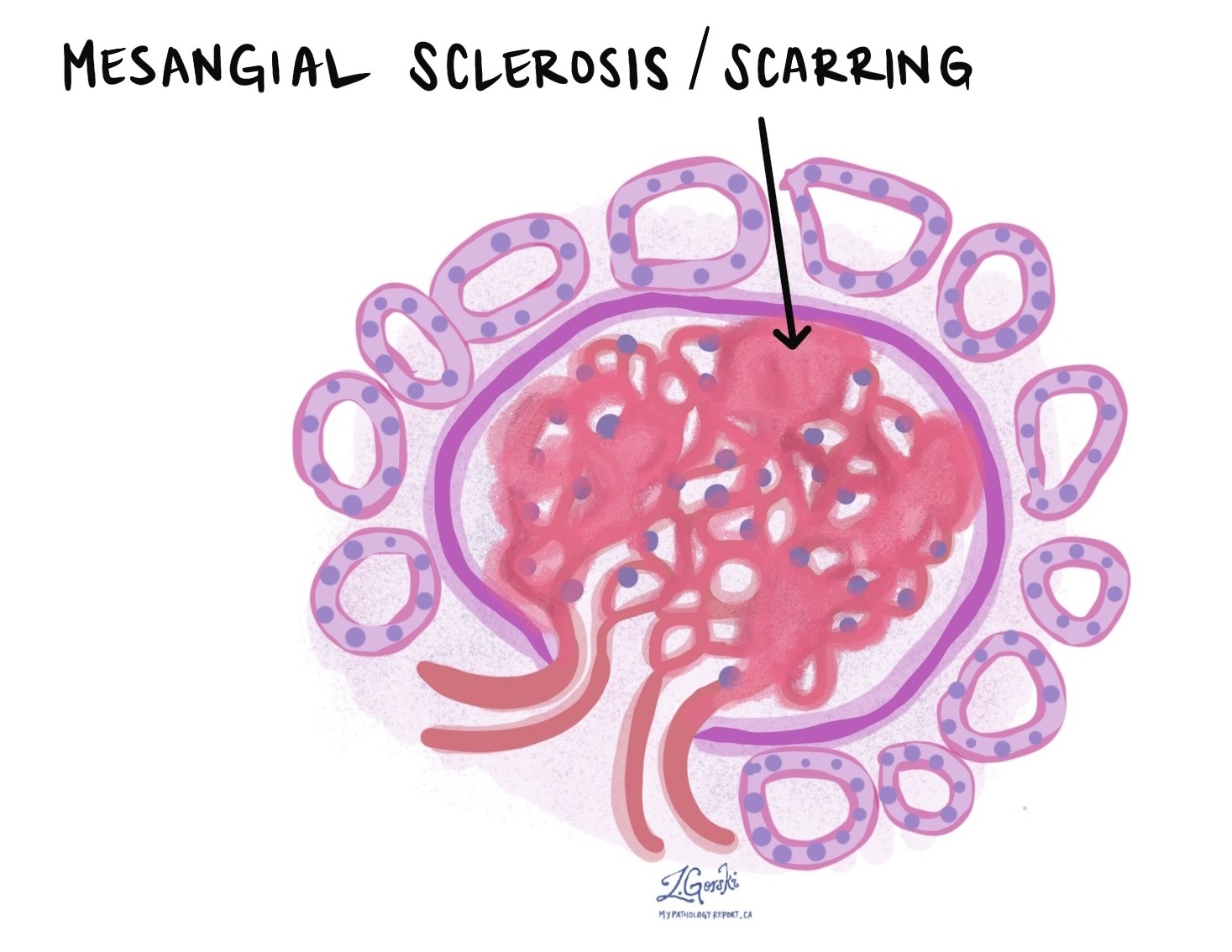Mesangial sclerosis refers to scarring or hardening (sclerosis) of a specific area within the kidney known as the mesangium. The mesangium is a support structure within the glomeruli, tiny filters in the kidneys responsible for removing waste and excess fluid from your blood. When the mesangium becomes scarred, it can impair kidney function, leading to chronic kidney disease or kidney failure.

What medical conditions are associated with mesangial sclerosis?
Mesangial sclerosis is associated with several kidney-related conditions, including:
- Diabetic nephropathy.
- Hypertensive nephropathy (kidney damage from high blood pressure).
- Chronic kidney disease.
- Focal segmental glomerulosclerosis (FSGS).
- Congenital nephrotic syndrome.
- Certain autoimmune disorders.
What causes mesangial sclerosis?
Mesangial sclerosis can result from long-standing conditions such as diabetes and high blood pressure, which cause ongoing stress and injury to kidney tissues. Genetic factors, autoimmune disorders, and chronic inflammation may also contribute to mesangial scarring. The damage occurs over time, leading to a gradual buildup of scar tissue in the mesangium.
What are the symptoms of mesangial sclerosis?
In early stages, mesangial sclerosis may not cause noticeable symptoms. As kidney function worsens, symptoms can develop, including:
- Swelling in the legs, ankles, or face.
- High blood pressure.
- Fatigue.
- Increased urination, especially at night.
- Protein in the urine (seen as foamy urine).
- Loss of appetite and nausea.
What does mesangial sclerosis look like under the microscope?
Under the microscope, pathologists see an increased amount of fibrous (scar) tissue in the mesangium. The mesangial area appears thickened and dense due to the buildup of collagen and other scar proteins. Unlike healthy kidney tissue, scarred mesangial tissue is less functional and disrupts normal filtration within the glomeruli.
Is mesangial sclerosis reversible?
Typically, mesangial sclerosis is not reversible once significant scarring has developed. However, early detection and management of the underlying cause may slow or halt its progression, helping to protect remaining kidney function.
What is the difference between mesangial sclerosis and glomerulosclerosis?
Mesangial sclerosis specifically refers to scarring within the mesangium, a specialized support structure located within the glomerulus. Glomerulosclerosis, in contrast, describes more widespread scarring that affects the entire glomerulus, including areas beyond the mesangium. Thus, mesangial sclerosis is a more localized form of scarring compared to the broader term glomerulosclerosis.
What is the prognosis for someone with mesangial sclerosis?
The prognosis for mesangial sclerosis depends greatly on the underlying condition causing it and how early it is diagnosed and treated. If identified early and effectively managed, many people can preserve their kidney function for an extended period. However, advanced mesangial sclerosis can lead to significant kidney impairment and potentially require dialysis or kidney transplantation.
Questions to ask your doctor
- What is causing my mesangial sclerosis?
- How advanced is the scarring in my kidneys?
- What treatments do you recommend?
- Are there lifestyle changes I can make to slow the progression of this condition?
- How frequently should I have my kidney function tested?
- What symptoms should prompt me to seek immediate medical attention?
- Should I see a specialist, such as a nephrologist?



